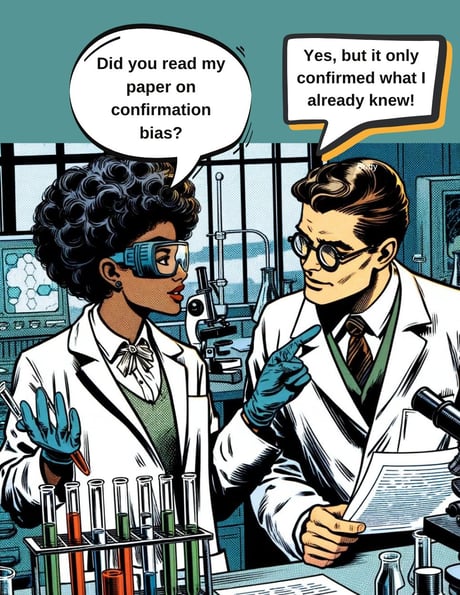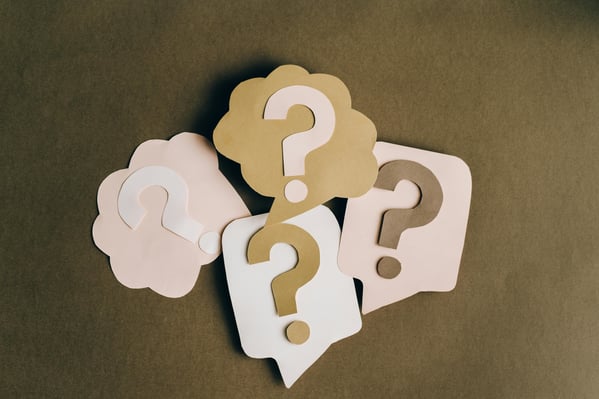This is the first in a series of short features on the impact of behavioral science principles in market research. Many firms excel at identifying and understanding data, but MDRG emphasizes System 1, or nonconscious thinking, to put our data into context in ways that create more actionable and relevant findings. Behavioral science principles and frameworks play a big role in how we do that.
TL;DR: We’re going to tell you some of the forces we pay attention to that might affect research data, and, when taken into account, can change the meaning of the data completely.
In this blog, we’ll look at confirmation bias.

Why is Behavioral Science Important in Marketing Research?
Answer: Because data doesn’t exist in a vacuum, and without context, it doesn’t tell the whole story. Behavioral science adds the ‘why’ that people often can't verbalize.
Viewing data through the lens of behavioral science provides insights into the psychological, social, and emotional factors influencing consumer decisions. When companies identify these driving forces, they can:
-
Build more engaging and effective marketing strategies
-
Better predict market trends
-
Improve customer experience
-
Create products that truly meet the needs of the customer
Want to dive deeper? Click for more info on behavioral science.
What is Confirmation Bias?
Confirmation bias is a behavioral science principle in which people seek, interpret, and remember information that serves to confirm their existing beliefs or attitudes. They will also dismiss or ignore information that contradicts these opinions.
As an example, let's imagine you're doing a market research project where you’ve asked people which superhero is the best. If someone grew up loving Spider-Man, they might only remember when Spider-Man did amazing things and forget about times other superheroes were just as amazing. Spider-Man's virtues stand out in their mind much more than others’, so they continue to validate their opinion by seeking information that supports it.

This is one way confirmation bias can show up in what people say in market research. When asked about something they have an existing opinion on, people may focus on the information that confirms their opinion and dismiss anything that challenges it. As a result, when asked for feedback or a preference, they may lean to what they favor instead of fairly considering all options presented.
This means their answers are more about what they believe or want to believe, instead of being about everything they could know. It doesn’t mean that other heroes aren’t as strong; it means their feats of strength aren’t resonating with the consumer.
See how this could affect market research?
How MDRG Corrects for Confirmation Bias
Confirmation bias can show up in quantitative surveys, qualitative interviews, and even in researcher analysis. Here are some of the tools we use to control for it... or identify it.
Research Design

MDRG begins by considering if confirmation bias could be a factor, then designing studies to remove or reduce its effect.
Questions we may ask include:
- How important were your pre-existing beliefs or attitudes in your decision?
- Did you encounter any information that challenged your beliefs about our product or service? If so, how did you respond?
- How did you evaluate the credibility of information used to make your decision? Did you discount or ignore sources that contradicted your beliefs?
Data Analysis & Confirmation
Analyzing behavioral data can provide powerful insights into the impact of confirmation bias.
Tracking content that people engage with online can show they are more likely to click on content that confirms their beliefs or ignore things that challenge them. We then consider this in the context of the data collected to form our insights.
We can also present participants with information that challenges their beliefs and assess their responses to see if they are more likely to find ways to discount it.
Overcoming our Own Confirmation Bias
As researchers, we often have hypotheses about what a study may reveal, but we are careful to approach each study with an open mind and rely on the data to tell the story.
MDRG’s unique Whole MindTM process incorporates behavioral science when we develop our insights.
To see how we can help you understand your consumer better, contact us!
Are you eager to stay ahead of the curve in your industry? Sign up for our monthly insights email and gain exclusive access to valuable market research, industry trends, and actionable recommendations delivered directly to your inbox.
Topics from this blog: Consumer Insights Market Research System 1 Methodology Research Methods